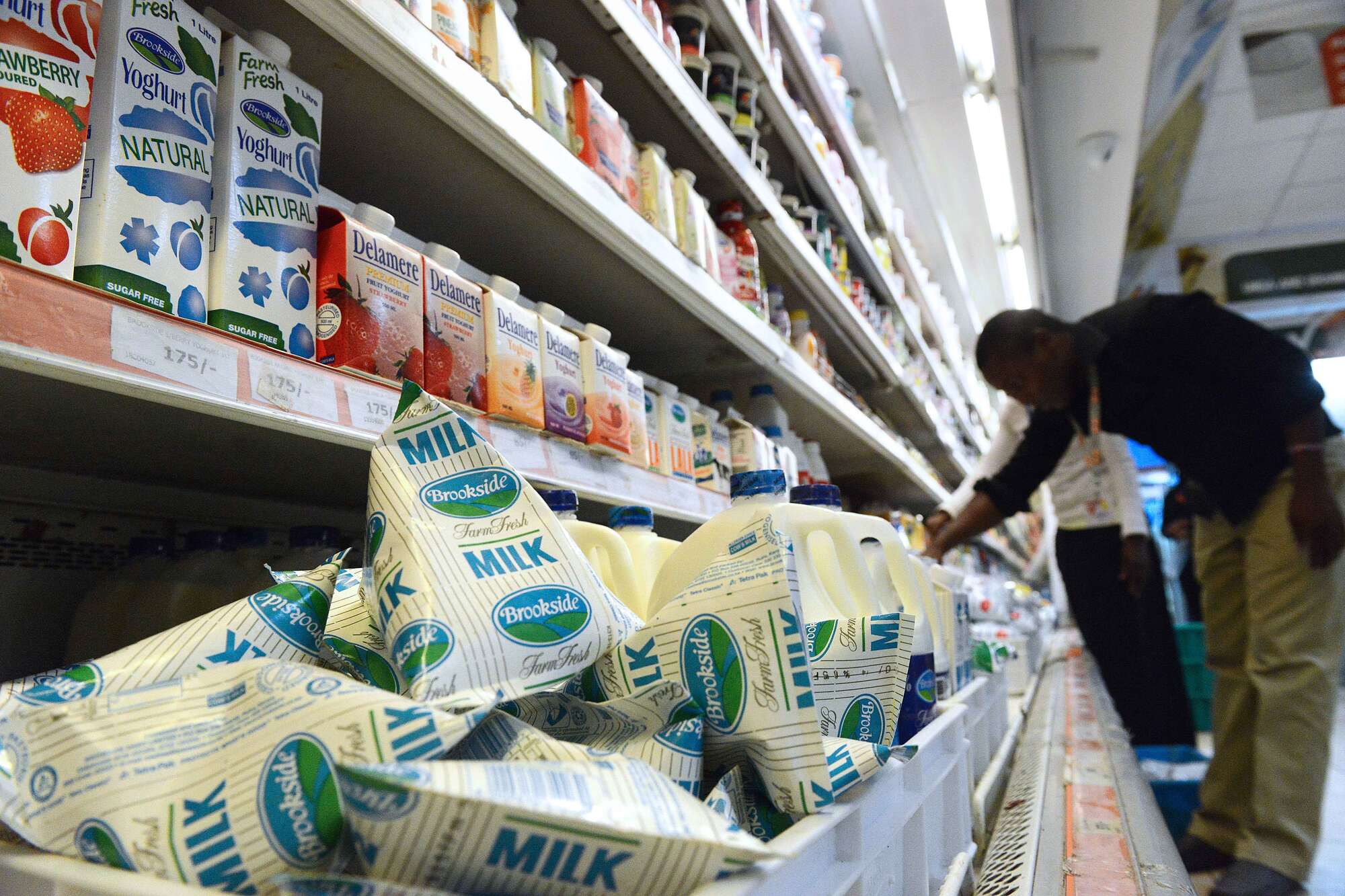
A consumer shops for Brookside dairy milk products in a supermarket in Nairobi, Kenya. PHOTO | SIMON MAINA | AFP
The Ugandan government risks losing Shs10 billion annually if an impasse with Kenya, her neighbour, over milk exports is not resolved, a top official at Brookside Dairy Limited has warned.
“Since March last year, we have applied for export permits 114 times and it is either not granted, suspended or delayed,” Mr Benson Mwangi, the managing director of the dairy processing company’s subsidiary in Kampala, told Sunday Monitor.
He added: “I can’t imagine the impact on the milk and milk products value chain as a result of being denied permits to export. People supplying packaging materials, our regular transporters and even farmers are all experiencing loss if not shortage of income because of this situation.”
The milk sector, according to President Museveni, has potential to supply 5.3 billion litres annually.
The company that processes and packages powdered milk, long-life milk, cream, butter, yoghurt, and ghee for a largely export market, has not only been operating at below 50 percent production capacity but also rendered over 200 employees jobless. Brookside Dairy Limited has been forced to concentrate on a domestic market in Uganda that musters a daily consumption of no more than 300,000 litres.
“Our production is at a very minimal level if this matter is not resolved, milk productions could take a hit permanently disenfranchising a fairly well-established milk value chain,” Mr Mwangi said.
The issue came up during a recent bilateral meeting between President Museveni of Uganda and his Kenyan counterpart William Ruto.

President Museveni meets with his Kenyan counterpart William Ruto (C) and Kenya opposition figure Raila Odinga during their visit to Kisozi Farm in Uganda on February 26, 2024. PHOTO/PPU
The milk sector, according to President Museveni has potential to supply 5.3 billion litres annually.
While a joint communique issued after the meeting in mid-May made clear efforts to respect and fully implement the East African Community (EAC) customs union and common market protocols, Brookside said nothing tangible has been felt from their side.
Yet the communique directed that there should be no more quotas on goods originating from within EAC member states such as poultry and poultry products, dairy and dairy products, cereals, sugar, juices, pishori rice and furniture.
“We have still been denied export permits for our milk powder and long-life/UHT milk by the Kenya Dairy Board,” Mr Mwangi revealed.
Trade tiff
Kenya has been the leading buyer of Uganda’s milk products, although the trade relations have not been consistent due to several barriers. This prompted Uganda to search for new markets for its milk and milk products.
On March 6 last year, the Kenya Dairy Board stated that the government of Kenya had stopped the importation of milk powders to cushion the industry from surplus production and low producer prices. This announcement directly reinstated the 2021 ban on Ugandan milk products importation into Kenya, which went against Kenyan President Ruto’s directive to lift a ban on Ugandan agricultural produce such as milk, eggs and chicken.
Uganda Dairy Development Authority (DDA), following complaints from some exporters and producers, said authorities in Kenya were limiting the number of export permits for powdered milk from the country.
In March, Kenya imposed a ban on Ugandan powdered milk, saying it was to protect local producers, but lifted the ban a couple of weeks later.
When contacted this past week, Dr Julius Byaruhanga, the director of policy and advocacy at Private Sector Foundation- Uganda (PSFU), said: “This matter is not new. This disruption has been going on for a while. The last time I checked, Brookside had been denied more than 80 export permits, something we don’t believe is normal.”
He added: “However, engagement at the level of the presidency is going on and we need this matter resolved once and for all. From our side, we will continue to engage because we are opposed to any form of non-tariff barriers.”
‘Baseless claims’
Although the EAC Common Market guarantees unfettered free movement of goods and services, Kenya, per the Uganda Manufacturers Association (UMA), has completely ignored the EAC Common Market commitments and has oftentimes wantonly barred Ugandan goods from entering the neighbouring country.
According to UMA, Kenya always questions the origin of Uganda’s products, even those with valid certificates of origin, making it difficult to access the lucrative Kenyan market.
This is in addition to what UMA called “baseless claims” that products from Uganda are counterfeit. The products, UMA added, bear certified Q marks issued by Uganda National Bureau of Standards, which should be respected across the region.
Further, claims abound that goods from Uganda are smuggled into Kenya hence evading taxes. Enforcing arbitrary permits that water down the very essence of the EAC Common Market through unilateral restrictions against Uganda-originating goods and structured and institutionalised harassment of Kenyan traders and dealing in Ugandan originating goods has, per UMA, not helped matters. The association further protests that this has been done with the view to discouraging dealing in Ugandan-made products, especially poultry, milk, and sugar products, among others.
According to Mr Samson Akankiza Mpiira, the executive director of DDA, the dairy value chain is one of the most dynamic sectors in Uganda. It is, he added, critical to the development of the rural economy and household transformation.
“This is due to its role in nutrition, income and employment security of persons. It is a priority sector in the Agro-industrialisation and “real economy” agenda and the Vision 2040,” he said.


